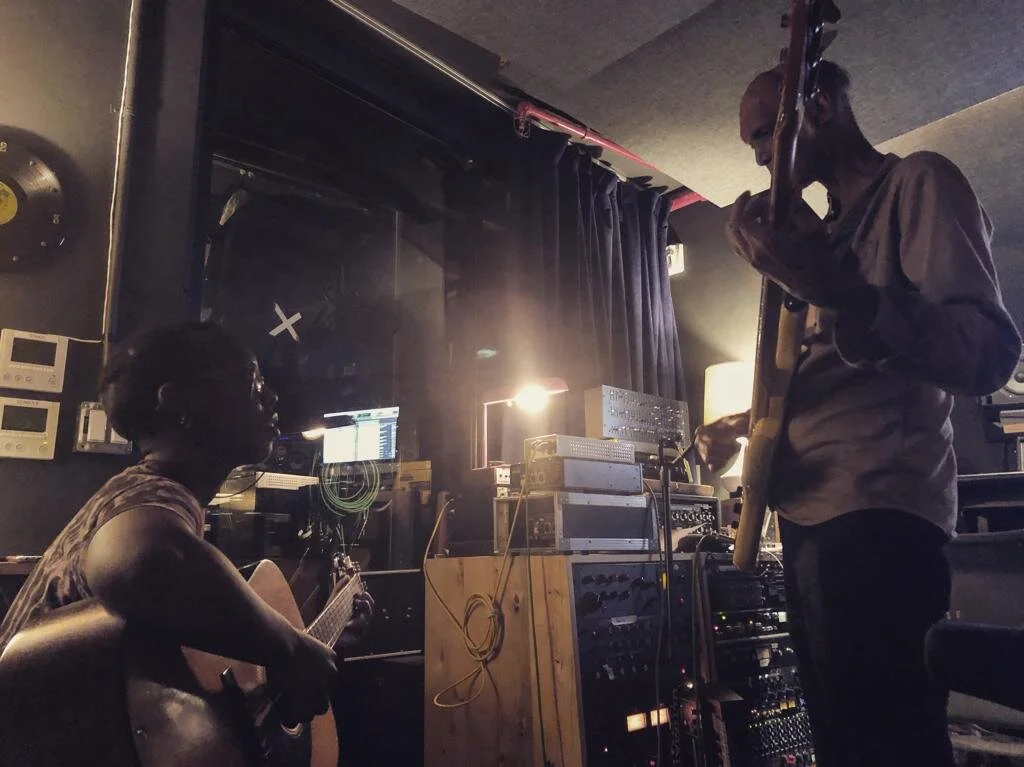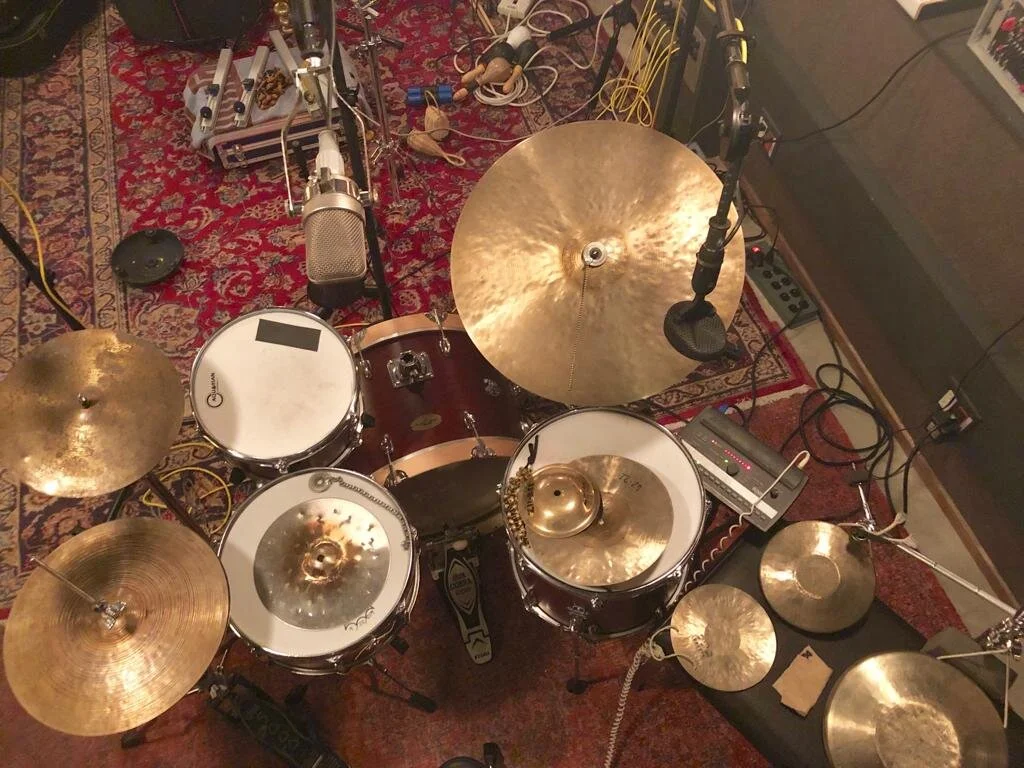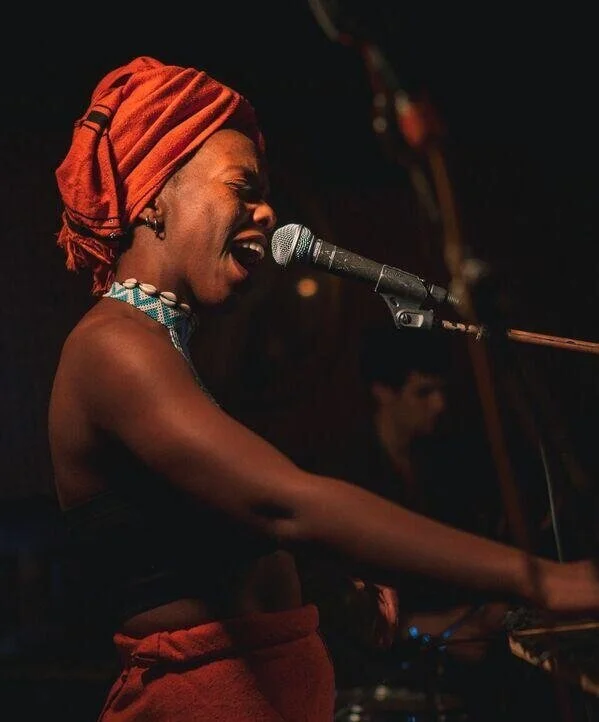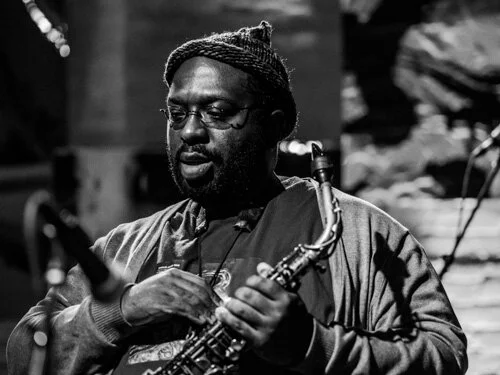Not In Praise of Poison (NIPP) is an album embodying multicultural collaboration that represents and explores archival processes about immigration, the experience of black women, and political transcendence in both internal and external states of being and mind. Written by Gugulethu ‘Dumama’ Duma and Dylan ‘hunterchee’ Greene with elders, Shahzad Ismaily and Christopher Botta, the work is named in honor of both protest and Jean-Michel Basquiat’s journaling. NIPP focuses heavily on the complexities and similarities of the histories and current political climates present in South Africa, the United States, Pakistan, and China - places of heritage for the project's leading composers, producers, and artists - in an attempt to create more solidarity and solutions for and between one another when it comes to their tandem humanitarian crimes. Resistance tools such as decolonization, demilitarization, criminal justice reform, and a resistance to aparthedid-conomics, play a major role in the lives of those oppressed by larger powers and such refractions and reflections are cast in sound here. We found like minded creations and interpretations in the music of Angel Bat Dawid, Makaya McCraven, and Perrin Moss. Paired with the influence of multidimensional thinkers, poets, and writers such as bell hooks, Koleka Putuma, Ben Okri, and Marcus Scott, Dumama and hunterchee express a fraction of those voices through the Politics of Care, Eating the Other, Rupture, The Interference Archive, Caring for Captivity, Mama Carries Wood, Quite Suite, A Loud Tender, and The Nature of Direarchy.
NIPP traces the prismatic relationships within and around a tryptic of themes - inner voice, self care, and interruptions - felt, explored, viewed, and sung from three angles: a child daughter, an adult mother, and an elder grandmother. On the record, these narratives converse, overlap, and become one another in a multiverse of lived experience and study. Such a framework or quantum realm, provides a garden full of questions to feed and observe. The natural tensions and contradictions of these narrative paths that intertwine and punctuate each other created confusion, distraction, and the need for re/unframing. Each became a source for inspiration and drive.
The Xhosa musical tradition is rooted by the practice of reflecting realities back to the community, connecting and mediating individuals’ inner realities with functions of everyday life such as birth, war, pain, recreation, ritual and ultimately, histories re-enacted. This approach is integral to the myths and metaphors, narratives and allegories present in NIPP. We let this interplay of written and unwritten, pre-written and post-written, run wild by blending Xhosa folk music with American minimalism, and free improvisation with contemporary classical modernism via RnB. It’s from this unique palette that we paint stories in which we proudly represent, promote, and add to the voices of Black Womxn composers in both the classical and jazz arenas. Arenas that must heed the global call for clear support and representation. As teachers currently working to reform prison pipeline complexes and to archive voices of cultural practitioners, we envision a series of composition workshops for teens facing issues and themes we address. NIPP is decolonization through artistic action.
Track List
01 Tsotsi
02 Indalo
03 Isiko Lisiko
04 Eating the Other
05 Ansinnamzi
06 Mama Carries
07 Rupture
08 The Interference Archive
09 Caring for Captivity
10 A Nowhere Place to Call Home
11 The Nature of Direarchy
12 A Loud Tender
13 Quite Suite
The Making of
Songwriter Dumama, channels lived experiences of living and departed ancestors in the creative process. She lost a maternal grandmother 2 weeks before the making of this work. The day the recording process started at Figure 8, Dumama received news from South Africa about her grandmother’s burial site. It had been vandalized, amongst other things. This dysfunction and harmonized cosmic mayhem of black lives on the planet, not only informs the process but it also inspires intention and direction towards collective healing.
Energetic flow was a daily consideration. The days’ inspiration was fed by a small library kept in the studio throughout the recording and work about the black contemporary situation by Marcus Scott Williams and Koleka Putuma was read by all involved. Specific time was dedicated both to meditating on nothing and to improvising. Pre composed works were completed on different days to gather different tones and energies. Jam sessions with musicians outside the project as well as jam sessions of conversation were had during the process. Dance music and days off were crucial. An exclusive and free exhibit of grandmaster Basquiat’s original works was attended. A producers’ mother losing her hearing was both interviewed and cared for by the artists and in the artists’ home, serendipitously referencing the original title of the project The Life of Grandma. And because intimate relationships seemed to gravitate towards the process itself, the politics of care was held with a conscious grace.
These factors resulted in a collaborative effort to harmonize the overlapping of personal and global phychospiratual processes through which the artists’ personal cultures and carried histories contributed to the work like a backpack does to school and to life beyond.
New York, a multiverse type of place that can be conceptualized as an airport by those non-native, has long been a place in which cultural coalescence is lived and conversated about through artistic movements and their crossovers - as seen through the lense of work by poets like Saul Williams, Marcus Scott Williams, and Basquiat. A kind of melding of shared and unshared experiences. With that preface, that conversations about immigrants and their experience, crises and successes throughout time and therefore the colonial histories of Pakistan, South Africa, China, and the United States, become natural and indeed native to the process and paths we found ourselves embarking upon. The tension, fear and concern for the well being and survival of oppressed groups has intensified with the surge of global nationalism and the violence inherent to it. These complexities of feeling helpless, yet urgently responsible manifest here.
Project Leaders - composers and producers
Gugulethu Duma (Dumama)
Project Leader, Producer, Songwriter, Composer, Vocalist, Uhadi
dumamamusic.com
Gugulethu is a South African future folk performing artist, songwriter and cultural researcher. Inspired by issues around inequality and displacement, she experiments with notions of ancient sounds in a new world, with projects concerned with cultural preservation and the tension and harmonies present in intergenerational exchanges. Reimagining folk music of ancestors, living and deceased, Dumama works with the voice, live loops, hand-made bow instruments and distortions. Fascinated by sound’s power, the tonal emergence and decay in certain frequencies and emotions evoked within these frequencies, Dumama passionately explores music as a tool for social transformation and healing. In 2018, Dumama was a Moving Africa fellow with Goethe Institute for the Dak’art Bienalle and a USA touring artist with OneBeat, an initiative of the U.S. State Department’s Bureau of Educational and Cultural Affairs where she met the musicians in this collective. She has performed at Rocking the Daisies, National Arts Festival, Zeits MOCAA, Red Bull Studios, to name a few. She was invited to speak at the 2nd International Bow Conference in KZN in 2018, and gave a masterclass for A World Cultures Class at The College of Charleston, USA. Dumama makes music that creates fertile foundations for the re-imagination and rewriting of our narratives. Her aim is to inspire transformation in African and global contexts around knowledge production, spirituality for disruption, reflection, and collective healing.
Shahzad Ismaily
Project Producer, Mentor, Composer, Bassist, Synth
Shahzad was born to Pakistani immigrant parents and grew up in a wholly bicultural household. While he holds a masters degree in biochemistry from Arizona State University, he is largely a self-taught composer and musician, having mastered the electric and double bass, guitar, banjo, accordion, flute, drums, various percussion instruments and various analog synthesizers and drum machines. Ismaily has recorded or performed with an incredibly diverse assemblage of musicians, including Laurie Anderson and Lou Reed, Tom Waits, Jolie Holland, Laura Veirs, Bonnie Prince Billy, Faun Fables, Secret Chiefs 3, John Zorn, Elysian Fields, Shelley Hirsch, Niobe, Will Oldham, Nels Cline, Mike Doughty (of Soul Coughing), Graham Haynes, David Krakauer, Billy Martin (of Medeski Martin and Wood), Carla Kihlstedt’s Two Foot Yard, the Tin Hat Trio, Raz Mesinai and Burnt Sugar. He has also composed regularly for dance and theater, including for Min Tanaka, the Frankfurt Ballet and the East River Commedia. Recently he composed the score for the critically acclaimed movie Frozen River, which won the Grand Jury Prize at the 2008 Sundance Film Festival. He was also an Artist in Residence at the Headlands Center for the Arts in San Francisco, CA in 2008. Currently based in New York , Ismaily has studied music extensively in Pakistan, India, Turkey, Mexico, Santiago, Japan, Indonesia, Morocco and Iceland.
Dylan Hunter Chee Greene
Project Leader, Musical Director, Composer, Drummer, Percussionist
Dylan Hunter Chee Greene, is an Asian-American drummer and composer, percussionist and producer based in NYC. His collaboration spans multiple genres, art forms, and lineages. From artful pop to electronic jazz, Baroque drum and bass to contemporary and cultural crossover, Dylan has performed and recorded with the Grammy Nominated A Far Cry Chamber Orchestra, WNYC’s podcast RadioLab, the American Rep Theatre conducted by Matthew Aucoin at the Brooklyn Academy of Music (BAM) Next Wave Festival, with bands opening for Olga Bell (Dirty Projectors) and Andrew Bernstein (Horselords), and the Bessie Award winning ‘There Might Be Others’ by Rebecca Lazier and Dan Trueman alongside Sō Percussion, Mantra, and Mobius Percussion at New York Live Arts. His compositions, session recordings and arrangements for independent recording artists, choreographers, and visual installation artists, have been heard at venues such as Alvin Ailey and the Detroit Institute for the Arts. He was a 2016 Bang On A Can fellow at Mass MoCA and a 2018 OneBeat fellow through the US State Department. Dylan currently accompanies classes for Mark Morris Dance Center and José Limón Dance Foundation.
Christopher Botta
Project Producer, Recording/mix/master Engineer
is a composer, mixing engineer, and guitarist from Brooklyn, NY. He is a composer/bandleader/guitarist of the garage-chamber septet “the cellar and point”. Members of the ensemble include players from the JACK Quartet, Mivos Quartet, Mantra Percussion, Transit, and Ensemble Signal. He runs a mixing/mastering studio in Brooklyn called ‘Staple Chest Audio’, where he mixes pop and avant-garde music.
Collaborators
Darius Jones
Mentor, Saxophonist
dariusjonesmusic.com
Over the past decade, Darius Jones has created a recognizable voice as a critically acclaimed saxophonist and composer by embracing individuality and innovation in the tradition of African-American music. “Jones' concept is proudly his own,” writes Philip Clark in The Wire. [His music] poses big questions about the relationship between the African-American tradition of spirituals, blues and gospel, and now." With New York City as his base since 2005, Jones has brought his unique sound to dozens of cities around the United States, Canada and Europe.
Jones early on established himself as a powerful voice in the jazz community and was nominated in 2013 for Alto Saxophonist of the Year, and for Up & Coming Artist of the Year two years in a row for the Jazz Journalists Association Jazz Awards. Jones was one of Jazz Times' Debut Artists of the Year for 2009 and was featured in the Wall Street Journal in 2011. In 2012 he was featured in DownBeat and on WBGO's The Checkout. Jones' 2012 release, Book of Mæ'bul (Another Kind of Sunrise) was listed among NPR's Best Top 10 Jazz Albums of that year. "Jones speaks through his alto in an original and unforced language," writes DownBeat's Joe Tangari. Critics have called him "robustly creative" (Nate Chinen, New York Times) and "one of NYC's most incisive and passionate saxists" (Time Out New York). AllAboutJazz.com reviewer Troy Collins writes, "Jones has set the stage for a winning series of albums designed to document his rise as one of the most impressive and unique voices of our time."
Ben Okri
Poet, Novelist, Artist
benokri.co.uk
Ben Okri is a poet, novelist, essayist, short story writer, anthologist, aphorist, and playwright. He has also written film scripts. His works have won numerous national and international prizes, including the Booker Prize for Fiction.
He has also received many honorary doctorates for his contribution to Literature. Recently, his Grenfell poem, on Channel Four YouTube, has received more than 6million visits on Facebook.
Koleka Putuma
Poet, Writer
cocoputuma.wordpress.com
Her bestselling debut collection of poems Collective Amnesia has taken the South African literary scene by storm. Since its publication in April 2017, the book is in its 9th print run and has been prescribed for study at tertiary level in South African Universities and Gothenburg University in Sweden. It was recently awarded the 2018 Glenna Luschei Prize for African Poetry.
Putuma was recently appointed as creative director for the 2019 Design Indaba Conference, She is a Forbes Africa Under 30 Honoree, recipient of the Imbewu Trust Scribe Playwrighting Award, Mbokodo Rising Light award, CASA playwrighting award and the 2019 Distell Playwrighting Award for her play No Easter Sunday for Queers, which will also be published by Junketts later this year. She has been named one of the young pioneers who took South Africa by storm by The Sunday Times, one of 12 future shapers by Marie Claire SA, the groundbreaking new voice of South African poetry by OkayAfrica, and one of 100 young people disrupting the status-qou in South Africa by independent media.
Sonya Belaya
Pianist
sonyabelaya.com
Sonya Belaya is a Russian-American pianist, singer, composer, and improviser, who divides her time between Michigan and New York. Committed to multiplicity, she is a diverse music-maker invested in vulnerable art and the development of strong, personal collaborations. Her work centers on the integration of women’s trauma as musical narrative, with a focus on storytelling as a symbol of powerful vulnerability.
Sonya’s lead project is “Dacha”, an octet flowing freely through influences of creative music, jazz, folk, and contemporary music. Dacha was born out of a necessity to find a sense of home and belonging, when Belaya’s mother went missing in 2014. This resulted in the first project, “Songs My Mother Taught Me”, a five song cycle released in May 2019.
Marcus Scott Williams (MSW)
Poet, Writer
is a writer and artist living in New York City by way of Kansas City Missouri. His work is often predicated on themes like your relationship with your body, the creation of comfortable spaces, memory, & radical vulnerability. His first book, Spare Black Whimsy: A Memoir, is available on Amazon.
PJ Roduta
Percussionist
is a Pittsburgh-based percussionist whose work has centered around compelling dancers to dance since 2005. PJ earned a B.A. in music from Bennington College, completed a 4 month study abroad in percussion at the University of Ghana, and is currently pursuing his masters degree in teaching. Since 2007 PJ has been resident musician at The Space Upstairs, performed in 12 Pittsburgh-based music ensembles locally and overseas and scored 14 dance/film productions. In 2017 PJ was appointed full-time accompanist for Point Park University's Conservatory of Performing Arts and completed the Mark Morris accompanist training program in Brooklyn. In 2020 PJ will tour to China with his band Kinetic and begin an apprenticeship with the ritual groove composer Nik Baertsch in Switzerland.
Gyda Valtysdottir
cellist
Gyda Valtysdottir has been active as a musician since her early teens when she co-founded the experimental pop-group múm in the late 1990's.
Classically trained, Gyda has created music for films, installations, dance, among many other creative ventures, possessing a rare range of musical experiences which creates a unique alchemical compound.
Alden Slack
Baritone Saxophonist
is a baritone saxophonist and a die-hard jazz enthusiast living in Crown Heights, Brooklyn. He graduated from Bard College with a BA in music, specifically jazz performance and contemporary composition.


















